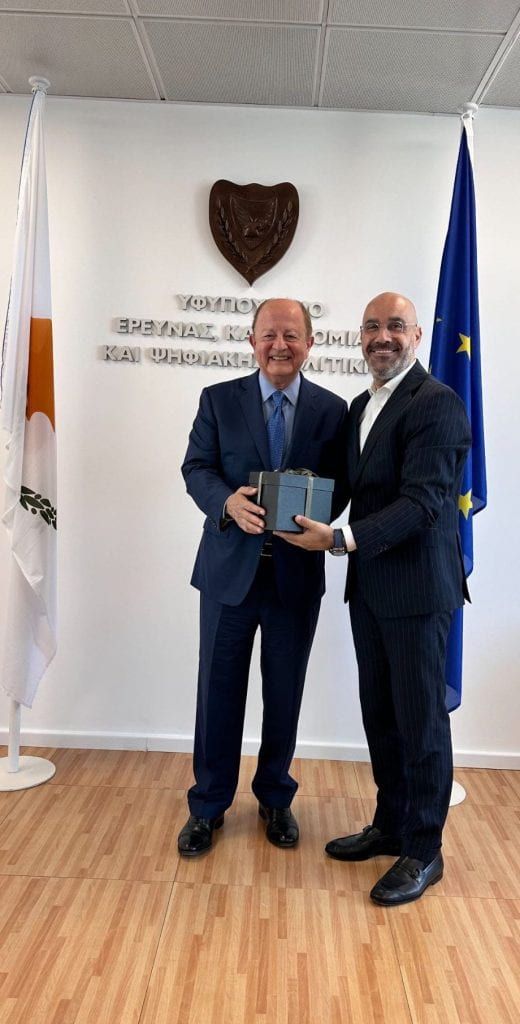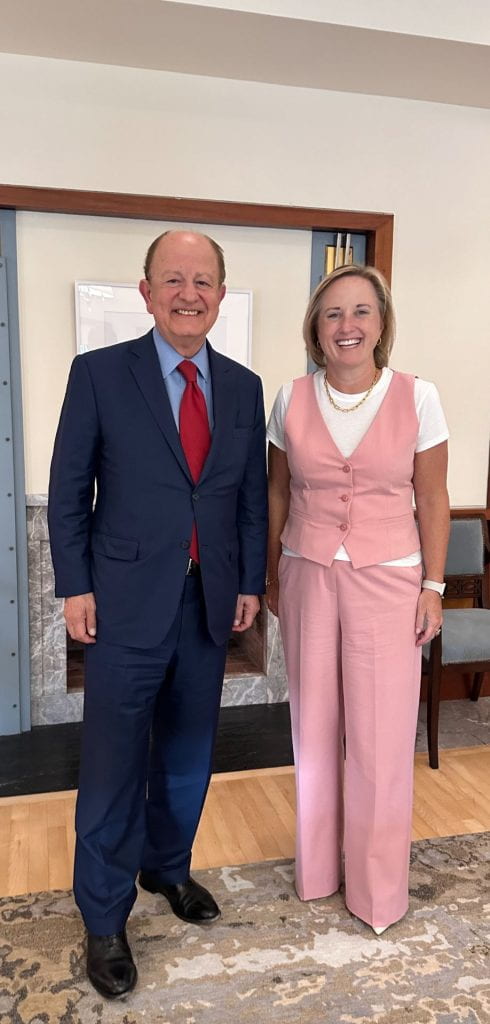On a recent trip to Cyprus, USC President Emeritus C. L. Max Nikias delivered two major speeches on artificial intelligence and semiconductor computer chips that drew widespread media attention in the island nation.

Cyprus’ Deputy Ministry of Research, Innovation and Digital Policy organized a workshop on artificial intelligence. Before his talk, Nikias met the Deputy Minister, Philippos Chatzizacharias. At the conclusion of the workshop, Chatzizacharias said the digital transformation of the state required the use of smart technological tools such as AI and he called for the establishment of a legislative framework for the rational use of AI.
Nikias also spoke to the 20th International Conference of Computer Analysis of Images and Patterns where he focused on the geopolitical storm swirling around the production of semiconductor computer chips, which he called “the world’s most important industry.”
Finally, while in Cyprus, Nikias met with the U.S. Ambassador to Cyprus, the Honorable Julie Fisher, to discuss summer programs at American universities for Cypriot students.
The two closely related and overlapping speeches were both keynote addresses at their respective events and this story draws from both of them.
“The brains behind the AI revolution are semiconductor computer chips,” Nikias said. “Chips are ever more critical in today’s economy. The 5G rollout is accelerating. Robotics, telemedicine, remote work and education, virtual and augmented reality, streaming entertainment, the Internet of Things and more and more household appliances, perhaps even your toothbrush …
“Everything runs on chips!”
He said that there are many AI apps for phones including apps to clone voices and faces. “Criminals are already using them in scams.”
Of all the technologies enabled by semiconductor computer chips, AI is currently the most important one, he said. Despite spending tens of billions of dollars, China has been unable to produce the advanced computer chips required by AI and increasingly has had to import them.
“Chips are China’s largest single import, even outstripping oil imports,” Nikias said.
Last October the U.S. Bureau of Industry and Security issued sweeping new export controls to curb the flow of advanced semiconductor technologies and chips to China. While aimed at keeping the technologies and chips away from China’s military, Nikias said the controls threaten to stop China’s impressive scientific and technological advances in other areas as well.
The U.S. is able to do this because it owns 90 percent of the intellectual property behind the technologies needed to make chips.
Nikias explained that today’s scientific advances are increasingly made by crunching huge datasets with AI programs. While scientists, engineers, government agencies and all manner of researchers have been using AI for years, AI has only recently spread to the wider public.
“Through AI tools such as ChatGPT, people have gained access vast amounts of data. AI is expanding into all aspects of human life,” he said. “The ethical challenges cannot be understated. Free access to inexhaustible sources of information poses risks and ethical dilemmas regarding intellectual property rights, issues of plagiarism and misinformation.”
Nikias predicted that AI will change the nature of work for many by becoming an ever-present co-pilot. “There are already more than 8 billion AI digital voice assistants in existence … more than the entire population of Earth.
“AI will do to the white-collar sector what automation did to factory work,” he said. AI could displace as many as 2 billion jobs worldwide with almost half of all jobs in the U.S. being at risk over the next 20 years.

But AI will also create many new jobs. Using AI, individuals can become immensely more productive.
“Many workers will need retraining,” Nikias said. “Note that most of the new jobs will require workers with STEM skills.”
While in Cyprus, Nikias toured two university centers of excellence where he had high praise for the innovations he saw there.
“A host of research institutes, centers, business incubators and accelerators demonstrate that the bonds among government, the business community and higher education are strong,” he said. “Cyprus is almost the perfect place for a major AI tech boom.”
But citing the 2022 European Commission Education and Training Monitor, Nikias said that only 13.1 percent of Cyprus university graduates are in STEM disciplines, and only 4.6 percent of all graduates are female STEM graduates.
“And related to that red flag is another,” he said. “The Cyprus labor force has too many workers lacking digital skills. Thirty-two percent possess low digital skills and 34 percent have only basic digital skills.”
Nikias said that semiconductor producers, spurred on by government incentives, are building new chip fabrication facilities, called fabs, in the U.S., Europe and Asia. Chip fabs are the most expensive factories ever built and they require highly trained workers, including many with advanced degrees in STEM disciplines. He noted that TSMC, the world’s largest semiconductor chipmaker, is building a fab in Arizona and is already experiencing problems finding skilled workers.
“Where are we going to find the talented scientists and engineers that the world’s most important industry needs for all of the new fabs and other facilities?” he asked. “We no longer have a chip shortage, but I believe we are hurtling full speed ahead into a global shortage of semiconductor brainpower.”
Nikias closed his AI speech with an AI fun fact.
“Forty-four percent of UK adults confessed that they don’t fully understand how AI works, but 51 percent of Europeans would like to replace their politicians with AI.”
Selected Quotes by C. L. Max Nikias Regarding Artificial Intelligence
“If the Big Data for training an AI algorithm are not diverse enough, they can perpetuate biases present in the data and influence decision making that can be harmful to marginalized groups in our society. How do we ensure fair AI outcomes?”
“There are serious concerns related to the collection and use of our personal data by AI systems. There will be a constant need for data protection regulations and cybersecurity.”
“Governments must create regulations and guidelines for ethical AI systems. The EU is considering far-reaching legislation on AI. The proposed AI Act would classify AI systems by risk and mandate use requirements. Similar efforts are taking place in the U.S. Congress.”
“Governments and all who use AI must take steps to ensure that the economic benefits of AI are shared equitably.”
“There is a great need to educate AI professionals and the general public about ethics. AI Ethics should be incorporated in college curricula as well as in high schools.”
“Strong partnerships are needed among Government, Industry and Academia to address the most important opportunities and challenges of AI.”
Further Coverage of Cyprus’ AI Workshop
Cyprus Times (original article in Greek)
Philenews – “Filippos Chatzizacharias: Establishing a legislative framework for artificial intelligence” (original article in Greek)
Philenews – “Artificial intelligence: 2 billion jobs will be lost – Cyprus is far behind” (original article in Greek)